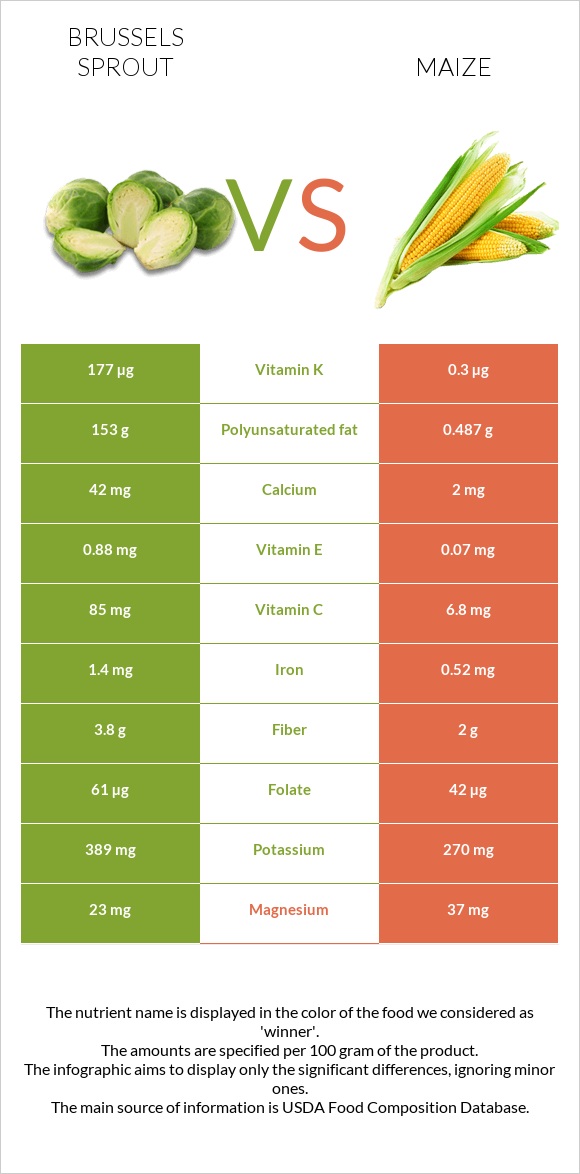Brussels sprouts vs. Corn — In-Depth Nutrition Comparison
Compare
What are the main differences between Brussels sprouts and corn?
- Brussels sprouts are richer in vitamin K, vitamin C, iron, vitamin A, folate, manganese, vitamin B6, and fiber, while corn is higher in vitamin B5 and vitamin B3.
- Brussels sprouts' daily need coverage for vitamin K is 147% higher.
- Corn has 15 times less vitamin C than Brussels sprouts. Brussels sprouts have 85mg of vitamin C, while corn has 5.5mg.
We used Brussels sprouts, raw and Corn, sweet, yellow, cooked, boiled, drained, without salt types in this comparison.
Infographic

Infographic link
Mineral Comparison
Mineral comparison score is based on the number of minerals by which one or the other food is richer. The "coverage" charts below show how much of the daily needs can be covered by 300 grams of the food.
| Contains more CalciumCalcium | +1300% |
| Contains more PotassiumPotassium | +78.4% |
| Contains more IronIron | +211.1% |
| Contains more CopperCopper | +42.9% |
| Contains more ManganeseManganese | +101.8% |
| Contains more SeleniumSelenium | +700% |
| Contains more MagnesiumMagnesium | +13% |
| Contains more ZincZinc | +47.6% |
| Contains more PhosphorusPhosphorus | +11.6% |
| Contains less SodiumSodium | -96% |
Vitamin Comparison
Vitamin comparison score is based on the number of vitamins by which one or the other food is richer. The "coverage" charts below show how much of the daily needs can be covered by 300 grams of the food.
| Contains more Vitamin CVitamin C | +1445.5% |
| Contains more Vitamin AVitamin A | +192.3% |
| Contains more Vitamin EVitamin E | +877.8% |
| Contains more Vitamin B1Vitamin B1 | +49.5% |
| Contains more Vitamin B2Vitamin B2 | +57.9% |
| Contains more Vitamin B6Vitamin B6 | +57.6% |
| Contains more Vitamin KVitamin K | +44150% |
| Contains more FolateFolate | +165.2% |
| Contains more Vitamin B3Vitamin B3 | +125.9% |
| Contains more Vitamin B5Vitamin B5 | +156.3% |
All nutrients comparison - raw data values
| Nutrient |  |
 |
DV% diff. |
| Polyunsaturated fat | 153g | 0.603g | 1016% |
| Vitamin K | 177µg | 0.4µg | 147% |
| Vitamin C | 85mg | 5.5mg | 88% |
| Iron | 1.4mg | 0.45mg | 12% |
| Vitamin B5 | 0.309mg | 0.792mg | 10% |
| Folate | 61µg | 23µg | 10% |
| Manganese | 0.337mg | 0.167mg | 7% |
| Fiber | 3.8g | 2.4g | 6% |
| Vitamin B3 | 0.745mg | 1.683mg | 6% |
| Vitamin B6 | 0.219mg | 0.139mg | 6% |
| Potassium | 389mg | 218mg | 5% |
| Vitamin E | 0.88mg | 0.09mg | 5% |
| Carbs | 8.95g | 20.98g | 4% |
| Calcium | 42mg | 3mg | 4% |
| Vitamin B1 | 0.139mg | 0.093mg | 4% |
| Calories | 43kcal | 96kcal | 3% |
| Starch | 7.17g | 3% | |
| Vitamin A | 38µg | 13µg | 3% |
| Selenium | 1.6µg | 0.2µg | 3% |
| Vitamin B2 | 0.09mg | 0.057mg | 3% |
| Fats | 0.3g | 1.5g | 2% |
| Copper | 0.07mg | 0.049mg | 2% |
| Zinc | 0.42mg | 0.62mg | 2% |
| Choline | 19.1mg | 29.1mg | 2% |
| Magnesium | 23mg | 26mg | 1% |
| Phosphorus | 69mg | 77mg | 1% |
| Sodium | 25mg | 1mg | 1% |
| Saturated fat | 0.062g | 0.197g | 1% |
| Monounsaturated fat | 0.023g | 0.374g | 1% |
| Protein | 3.38g | 3.41g | 0% |
| Net carbs | 5.15g | 18.58g | N/A |
| Sugar | 2.2g | 4.54g | N/A |
| Tryptophan | 0.037mg | 0.023mg | 0% |
| Threonine | 0.12mg | 0.133mg | 0% |
| Isoleucine | 0.132mg | 0.133mg | 0% |
| Leucine | 0.152mg | 0.358mg | 0% |
| Lysine | 0.154mg | 0.141mg | 0% |
| Methionine | 0.032mg | 0.069mg | 0% |
| Phenylalanine | 0.098mg | 0.155mg | 0% |
| Valine | 0.155mg | 0.191mg | 0% |
| Histidine | 0.076mg | 0.091mg | 0% |
| Fructose | 0.93g | 0.79g | 0% |
Macronutrient Comparison
Macronutrient breakdown side-by-side comparison
Protein:
3.38 g
Fats:
0.3 g
Carbs:
8.95 g
Water:
86 g
Other:
1.37 g
Protein:
3.41 g
Fats:
1.5 g
Carbs:
20.98 g
Water:
73.41 g
Other:
0.7 g
| Contains more WaterWater | +17.2% |
| Contains more OtherOther | +95.7% |
| Contains more FatsFats | +400% |
| Contains more CarbsCarbs | +134.4% |
~equal in
Protein
~3.41g
Fat Type Comparison
Fat type breakdown side-by-side comparison
Saturated fat:
Sat. Fat
0.062 g
Monounsaturated fat:
Mono. Fat
0.023 g
Polyunsaturated fat:
Poly. Fat
153 g
Saturated fat:
Sat. Fat
0.197 g
Monounsaturated fat:
Mono. Fat
0.374 g
Polyunsaturated fat:
Poly. Fat
0.603 g
| Contains less Sat. FatSaturated fat | -68.5% |
| Contains more Poly. FatPolyunsaturated fat | +25273.1% |
| Contains more Mono. FatMonounsaturated fat | +1526.1% |
Carbohydrate type comparison
Carbohydrate type breakdown side-by-side comparison
Starch:
0 g
Sucrose:
0.46 g
Glucose:
0.81 g
Fructose:
0.93 g
Lactose:
0 g
Maltose:
0 g
Galactose:
0 g
Starch:
7.17 g
Sucrose:
2.74 g
Glucose:
0.84 g
Fructose:
0.79 g
Lactose:
0 g
Maltose:
0.17 g
Galactose:
0 g
| Contains more FructoseFructose | +17.7% |
| Contains more StarchStarch | +∞% |
| Contains more SucroseSucrose | +495.7% |
| Contains more MaltoseMaltose | +∞% |
~equal in
Glucose
~0.84g
~equal in
Lactose
~0g
~equal in
Galactose
~0g





